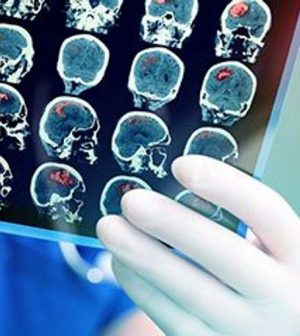- The Best Time of Day to Drink Bone Broth to Maximize Health Benefits
- 8 Ways to Increase Dopamine Naturally
- 7 Best Breads for Maintaining Stable Blood Sugar
- Gelatin vs. Collagen: Which is Best for Skin, Nails, and Joints?
- The Long-Term Effects of Daily Turmeric Supplements on Liver Health
- Could Your Grocery Store Meat Be Causing Recurring UTIs?
- Are You Making This Expensive Thermostat Error This Winter?
- Recognizing the Signs of Hypothyroidism
- 10 Strategies to Overcome Insomnia
- Could Artificial Sweeteners Be Aging the Brain Faster?
Brain Changes May Fuel ‘Long COVID’ Anxiety, Confusion

Here’s more evidence of the toll that COVID-19 takes on the human brain: A new study finds biomarkers of neuron damage and brain inflammation in the blood are associated with brain function changes in both hospitalized COVID-19 patients and people with long COVID.
Combined blood biomarker evidence of damage to neurons and activation of cells — indicating brain inflammation — was associated with symptoms of anxiety in people with long COVID.
The study could prove important, because it points to a real biological basis for long COVID symptoms, which are sometimes dismissed in people who experience a myriad of physical and psychological ills after recovery from COVID.
It “suggests there is a true relationship” between brain issues triggered by COVID-19 and these symptoms, said study co-author Barbara Hanson,of the Northwestern Medicine Neuro COVID-19 research lab in Chicago. Speaking in a Northwestern news release, she said she hopes “the observed correlation leads to future research into the mechanistic basis of these neuropsychiatric symptoms in long COVID patients.”
According to study author Dr. Igor Koralnik, “our study population was unique because we have matched cognitive and quality-of-life measures in addition to the typically studied COVID symptoms like shortness of breath, fatigue and brain fog.” He’s chief of neuro-infectious diseases and global neurology in the department of neurology at Northwestern Medicine.
Koralnik believes that “the most noteworthy finding is that we were able to look at a marker of nerve cell [neuron] damage and a marker of activation of supporting cells in the brain called ‘glial cells,’ which are elevated in other diseases of the brain such as multiple sclerosis.”
The 64 participants in the study included healthy people, as well as people who were hospitalized with COVID-19 at Northwestern Memorial with the acute brain dysfunction known as encephalopathy, the most severe neurologic sign of COVID-19 with symptoms ranging from confusion to coma.
The study also included non-hospitalized COVID long-haulers who were treated at the hospital’s Neuro COVID-19 Clinic.
The study was published online March 7 in the journal in Neurology, Neuroimmunology & Neuroinflammation.
More information
There’s more on long COVID at the U.S. Centers for Disease Control and Prevention.
SOURCE: Northwestern Medicine, news release, March 7, 2022
Source: HealthDay
Copyright © 2026 HealthDay. All rights reserved.










